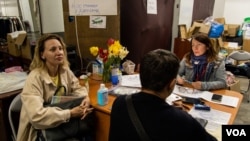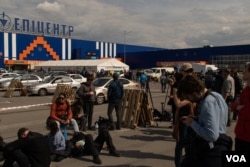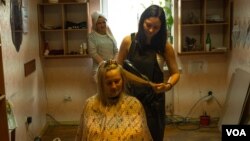After three months of bombardment and siege, Mariupol, a strategic Ukrainian city, is now occupied by Russia, with only pockets of Ukrainian fighters struggling to get out alive.
Over the past few months of war, many residents escaped alone or in small family units without a clear path to safety. It is not known how many civilians remain inside the city.
At refugee gathering spots in Zaporizhzhia, one of the first “safe” cities out of the war zone, we met families who escaped. Attacks have become more frequent in Zaporizhzhia, but it was quiet enough for them to relay some of their stories.
The families only wanted to use their first names for fear that relatives under Russian control could be punished. They also did not want to be photographed.
Max
“Mariupol!” said Max, 64, as the Viber app tune blared from his mobile phone. Moments ago, he had said it was hopeless and that there was no way to get in touch with his family.
His nephew, Eugene, could be heard through the phone. “Where are you?” he asked his uncle. “When are you coming?”
The phone call dropped. Max swore.
He had worked at a factory in his home city, Mariupol, before retiring. When Russia began hurtling bombs and bullets into the city in late February, Max stayed home, mostly underground, hoping the war would pass. But when his car was hit by an airstrike, he fled, leaving behind adult children and his nephew. Also left behind were some of their children, including a nine-year-old and a baby.
On this day in late April, Max waited near his borrowed car, lined up in a parking lot of a superstore that sells everything from groceries to flat-screen TVs in Zaporizhzhia, a city not now at war, although many fear it soon will be.
Most of the families in the parking lot were waiting for buses or convoys to take them to refugee centers or train stations, where they could join their families in western Ukraine or other parts of Europe. It was easy to spot who among them had come from Mariupol. They were thin, ashen and appeared to be in shock.
But Max’s convoy wasn’t moving toward safety. He was waiting to travel back into Mariupol.
The phone rang again and Max answered quickly. It was Eugene. His mobile phone had a few bars because he was at a Russian checkpoint, or “filtration center,” where soldiers investigate Ukrainian civilians trying to leave areas under their control.
Other families have told us the experience at “filtration centers” includes mundane, long waits, extensive document checks and sometimes more nefarious examinations. Several men described being stripped naked and examined for tattoos or other marks that indicate military service, or an affiliation with a Nazi party.
This time, Eugene did not sound anxious to move. “The Russian soldiers said they will turn on the electricity in the city and reopen the banks. You don’t have to come,” he said.
Max replied, “Just pack. I’m coming.”
“There must be Russian soldiers next to him,” whispered the VOA reporter and translator standing closest to Max.
Max covered the speaker with his hand and whispered back to us, “He’s scared.”
Moments later, someone made an announcement on a loudspeaker and Max jumped into the beat-up maroon sedan car with a woman, a neighbor and traveling companion who stared forward into the sun. Her husband and son were also still inside.
“Why are you wasting time talking?” she asked. “Let’s go.”
Ihor
On the other side of the parking lot, Ihor, 61, shied away from our cameras after volunteers beckoned us over, saying, “This man walked five days to get out of Mariupol.”
Ihor was thin and his skin coated with a layer of dirt. He smiled slightly when asked what drove him to leave Mariupol after suffering the siege for so long.
“Why?” he said wryly, “There is no city. It is gone.”
The volunteers brought him to a car they said would take him to a safe place to rest. He didn’t want to talk about what or whom he had left behind.
“I didn’t do anything special,” he said. “I’m no hero.”
Anton
At a converted hotel on the other side of the city, Anton, a 31-year-old former welder, said getting out of Mariupol was heartbreaking.
Along the way, his four-year-old daughter, Ganna, noticed the bodies on the sides of the road. “It’s terrifying to have to distract your child from the dead,” he said, weeping.
His wife, Nastia, 22, was pregnant when the war began, and they spent the first months on a dangerous odyssey deeper into Russian-controlled Ukraine to find a safe place to give birth. After little George arrived, the small family waited two weeks with a relative in Mariupol before making an attempt to escape the war.
They made it through checkpoints and the filtration center with little friction, presumably because they had a newborn and a small child in tow. But Anton’s brother stayed behind to care for their mother. Like many elderly in Mariupol, she didn’t want to leave. And so many others never had the chance to go, Anton added.
“It’s terrifying even to look out into the forest,” he said. “Because if you look too long you can see the place where the ground has been dug up. And you know, if the mound of dirt is small, it’s a child.”
Eugene
At the superstore parking lot, about an hour after the convoy to Mariupol departed, Max and his female neighbor returned, alone.
She was visibly angry and he looked defeated. There had been a list of names approved by Ukrainian authorities to pass a checkpoint. Their names were not on the list. No reason. It was a mistake.
“We aren’t going to be able to go today,” Max insisted. Even so, she didn’t want to look for a place to rest.
“Let’s go closer and sleep in the car,” she said.
Max said he didn’t really know what to do. When or if they get to Mariupol, it’s not clear they will be able to get their relatives out, or if their relatives will even be willing to go.
Most mobile phone and internet connections are cut off from the rest of Ukraine and the only media available are controlled by Russia. Locals are told areas still held by Ukraine are occupied or at war, and that there is no safety to be found beyond the Russian checkpoints.
“It’s hard for people still in Mariupol,” he said. “They are living in an information vacuum. They know it’s propaganda, but there is nothing else.”












